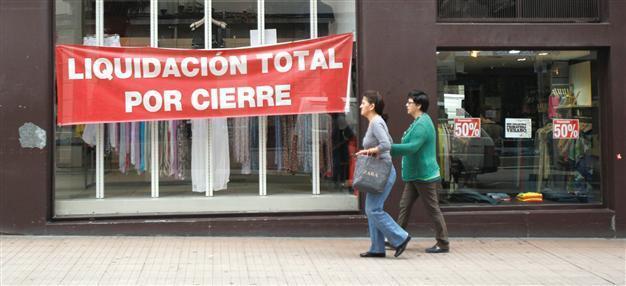Eurozone purchasing gauge backs rate cut expectations
LONDON - Reuters

Two women walk past in front of a clothing store window on a street of Pontevedra, Spain, June 29. Downturn in private sector in eurozone, grappled with debt woes of its southern members, eased only slightly in June. REUTERS photo
he euro zone’s private sector downturn eased only slightly in June as companies slashed prices, according to business surveys yesterday that supported expectations the European Central Bank will cut interest rates this week.
Markit’s Eurozone Composite Purchasing Managers’ Index (PMI), which surveys thousands of companies, was revised up in June to 46.4 from a preliminary reading of 46.0 that matched the May figure.
The index has been below the 50 mark that separates growth from contraction for nine of the last 10 months, suggesting the economic rot has spread to the core of the euro zone.
The PMIs have a good record of tracking economic growth and suggest the euro zone economy contracted 0.6 percent in the second quarter, which would be the largest quarterly decline in three years.
“Even Germany looks to have fallen into a renewed decline, though only a very modest drop in output is signalled. The pace of downturns in other major euro member states is far more worrying,” said Chris Williamson, chief economist at data provider Markit.
He said output in Italy probably declined 1 percent in the second quarter, with steep downturns also on the cards in Spain and France.
“Job losses are mounting as a result of falling demand, as companies seek to reduce costs and prepare for the possibility that worse is to come,” added Williamson.
The euro zone unemployment rate rose to a new record high of 11.1 percent in May, meaning some 17.6 million citizens were out of work across the 17-nation currency union.
And the composite PMI showed little sign of relief for workers - firms cut jobs for the sixth straight month as the employment index fell slightly to 48.3 in June from 48.5 in May.
While the services PMI also edged up slightly to 47.1 in June from 46.7 in the previous month, it was still anchored below the 50 mark for a fifth straight month.
It did however suggest inflation pressures are abating, as the prices charged by companies to consumers declined at the fastest rate in around two-and-a-half years. The output price index dropped sharply to 46.8 from 49.0 in May.
A sharp fall in oil prices held inflation steady at a 16-month low of 2.4 percent in June, cited by many economists as a major reason why the ECB may cut interest rates this week.
China services firms
China’s services firms grew at their slowest rate in 10 months in June, easing back from May’s 19-month peak, as new order growth cooled albeit while marking 43 months of consistent expansion, a private sector survey showed yesterday.
The China HSBC services PMI stood at 52.3 in June, down from 54.7 in May, indicating a marginal expansion of activity that capped job creation at a three-month low and bolstering expectations that Beijing will deliver further policy measures to boost growth.
“Services activities softened in June due to slowing new business flows, which translated into only marginal growth of employment,” Qu Hongbin, the Hong Kong-based chief China economist at survey sponsor, HSBC, said in a statement.
“This, plus the ongoing slowdown of manufacturing sectors, points to growing pressures on the jobs market - the last thing Beijing policy makers want to see. But with inflation also falling fast, we believe Beijing has sufficient room to step up easing and revive domestic demand,” Qu said.
The HSBC index, compiled by UK data provider Markit and tracking smaller firms mainly in the private sector, completes the series of China PMI releases for June that broadly leave investors anticipating more policy easing in the near future.
















